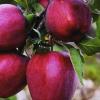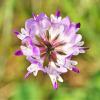Walnut (Juglans Regia) Extract is a water-soluble, liquid extract obtained from walnut shells (seeds) that contain Juglone. This oxynaphthoquinone principle is reported to have a bronzing effect on the skin. In addition, Oxynaphthoquinones, particularly Juglone, are thought to react with the keratin of skin and hair. This reported substantivity suggests that the use of walnut extract as a useful adjuvant in skincare products may offer benefits over and above their natural appeal as botanicals.
According to the literature, other constituents reported in walnut extracts include Quercetin glycosides, Camperol-o-Glycoside, tannins (Nucitannin), Ascorbic Acid, and Inositol. In addition, Walnut extracts typically contain 0.012 -0.029% of the essential oil, a yellow-green substance with a tea-like odor.
Juglone
Juglone (5 -Hydroxy-1,4-naphthalenedione) is present as a Hydrojuglone glycoside compound. In addition to the active principle, Juglans Regia seed extract contains gallic acid, ellagic acid, and various flavonoids and carotenoids.
The Merck Index cites that Resinoid Juglandin and Juglandic Acid may also be present. This mix of ingredients affords walnut extract functionality with fascinating diversity, as evidenced by many European studies and their subsequent claims to its efficacy. The most well-known and generally accepted of the assertions by the European community is that Juglone possesses skin-staining properties which are believed to have a bronzing effect on the skin.Ingredient products
Oxynaphthoquinones
Oxynaphthoquinones appear to bind themselves firmly to the horny layers of the skin, which allows bronzing to occur, with the ultimate effect resulting in sun protection. Studies using Juglone and Dihydroxyacetone (DHA) together, including one such account from the University of Minnesota, report that this particular combination appears to enhance coloration, give added sun protection and help even out the streaking commonly seen with DHA used. DHA is an artificial tanning agent classified as an uncertified color additive by the FDA.
An Italian study reporting on the properties of walnut bark states that naphthoquinones seem to differ from usual UV sunscreens in that they show no UV absorption. This suggests that Juglone, and similar substances, may possess particular screening properties against UV radiation. Instead, these colored sclerojuglonic compounds appear to react with the epidermal proteins in the skin, forming a barrier that protects the skin until sufficient melanin is produced. Besides its apparent self-tanning action, walnut extract exhibits astringent and antimicrobial properties.
According to several other European reports, it is said to inhibit perspiration and to have some degree of insect repellency. In addition, the presence of tannins gives walnut extract its astringent and antimicrobial characteristics. It is believed that tannins may bind loosely with the collagen fibers in the skin and form a coagulation membrane in the uppermost layers of connective tissue. From this heterogeneous mix of properties, Juglans Regia extract has a variety of exciting applications. The extract is especially recommended for use in suntan or after-sun care products and body creams. Other suggested uses include foot care preparations, preshave lotions, antiperspirants, insect repellents, and color shampoos.












